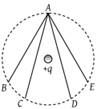Two equal charges q of opposite sign separated by a distance 2a constitute an electric dipole of dipole moment p. If P is a point at a distance r from the centre of the dipole and the line joining the centre of the dipole to this point makes an angle θ with the axis of the dipole, then the potential at P is given by (r >> 2a) (Where p = 2qa)
(1)
(2)
(3)
(4)
A charge \(+q\) is fixed at each of the points ..... infinite, on the \(x\)-axis, and a charge \(-q\) is fixed at each of the points ,..... infinite. Here \(x_0\) is a positive constant. Take the electric potential at a point due to a charge \(Q\) at a distance \(r\) from it to be \(\frac{Q}{4\pi \varepsilon_0 r}\). Then, the potential at the origin due to the above system of charges is:
1. \(0\)
2. \(\frac{q}{8 \pi \varepsilon_{0} x_{0} \mathrm{ln} 2}\)
3. \(\infty\)
4. \(\frac{q \mathrm{ln} 2}{4 \pi \varepsilon_{0} x_{0}}\)
Point charge q moves from point P to point S along the path PQRS (figure shown) in a uniform electric field E pointing co-parallel to the positive direction of the x-axis. The coordinates of the points P, Q, R, and S are and (0, 0, 0) respectively. The work done by the field in the above process is given by the expression
(1) qEa
(2) – qEa
(3)
(4)
Inside a hollow charged spherical conductor, the potential -
1. Is constant
2. Varies directly as the distance from the centre
3. Varies inversely as the distance from the centre
4. Varies inversely as the square of the distance from the centre
Two small spheres each carrying a charge q are placed r meter apart. If one of the spheres is taken around the other one in a circular path of radius r, the work done will be equal to
1. Force between them × r
2. Force between them × 2πr
3. Force between them / 2πr
4. Zero
Two charged spheres of radii 10 cm and 15 cm are connected by a thin wire. No current will flow, if they have -
1. The same charge on each
2. The same potential
3. The same energy
4. The same field on their surfaces
The electric potential V at any point O (x, y, z all in metres) in space is given by . The electric field at the point in volt/metre is -
1. 8 along negative x-axis
2. 8 along positive x-axis
3. 16 along negative x-axis
4. 16 along positive z-axis
A hollow metal sphere of radius 5 cm is charged so that the potential on its surface is 10 V. The potential at the centre of the sphere is -
1. 0 V
2. 10 V
3. Same as at point 5 cm away from the surface
4. Same as at point 25 cm away from the surface
If a unit positive charge is taken from one point to another over an equipotential surface, then -
1. Work is done on the charge
2. Work is done by the charge
3. Work done is constant
4. No work is done
In the electric field of a point charge q, a certain charge is carried from point A to B, C, D and E. Then the work done

1. Is least along the path AB
2. Is least along the path AD
3. Is zero along all the paths AB, AC, AD and AE
4. Is least along AE







